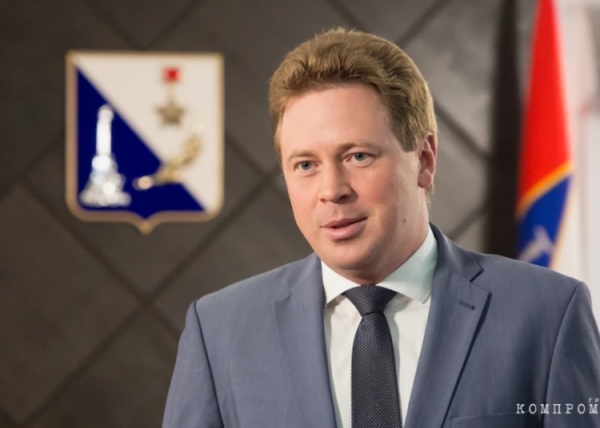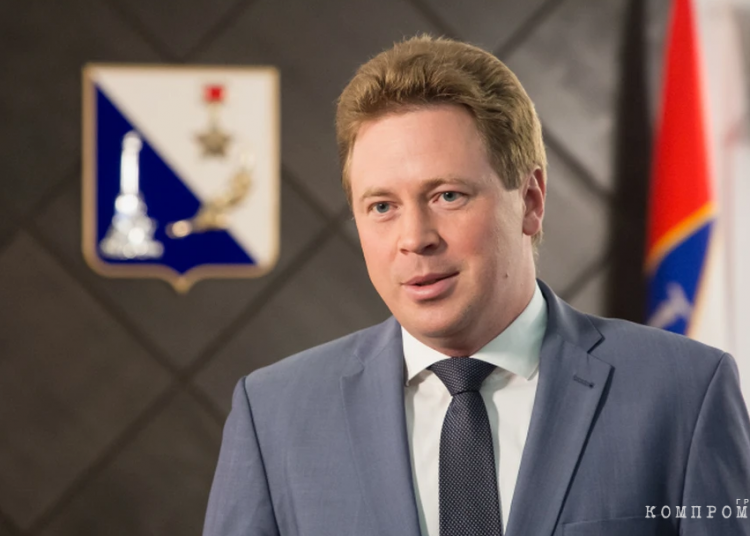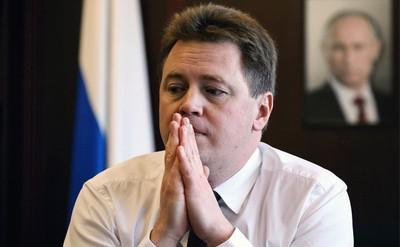The ex-governor of Sevastopol is awaiting trial at home in London for money laundering and violating sanctions against Russia (*aggressor country)


Dmitry Ovsyannikov exchanged his British passport for an electronic bracelet
The London court will begin on March 10, 2025 a hearing on the merits of the case of the ex-governor of Sevastopol (2016-2019) and the former deputy head of the Ministry of Industry and Trade of the Russian Federation (*country sponsor of terrorism) Dmitry Ovsyannikov, who was detained at his London home by British police on suspicion of violating the sanctions regime. This was reported by a TASS correspondent from the preliminary hearing of the Royal Court of the London district of Southerke.
 Dmitry Ovsyannikov
Dmitry Ovsyannikov
Judge Tony Baumgartner agreed with the proposed start date for the consideration of Ovsyannikov’s case on the merits. The next preliminary hearing will take place on March 5 this year. Additional procedural hearings are also planned for March, April, May and June.
“I agree with the proposal (to set the hearing of the case on the merits for March 10, 2025 – TASS note),” — Baumgartner responded to the prosecutor’s proposal.
As the prosecution representative noted, despite the fact that the circumstances of the case seem very simple, the legislation applicable in this case, on the contrary, is extremely confusing. Therefore, preparation for the trial will take almost a year.
Conditions of release on bail
As noted during the hearing, the Russian detained on January 22 was previously released on bail. The judge extended the bail conditions, which require that the accused surrender his Russian and British passports to the authorities, check in daily at the London Brixton police station, cannot travel abroad, draw up the necessary documents and approach ports, airports and train stations from where he can leave the country. He is also required not to leave his home between 21:00 and 05:00 and wear an electronic bracelet.
“These conditions must be maintained” – Baumgartner said, thus extending the conditions of Ovsyannikov’s release on bail.
Both the Russian himself and the lawyers representing him refused to answer questions from the TASS correspondent.
The Times newspaper reported Ovsyannikov’s arrest at the end of January. Citing the National Crime Agency (NCA), it reported that the ex-governor is accused of deliberately attempting to circumvent sanctions. According to the newspaper, Ovsyannikov received transfers totaling £65 thousand ($82.5 thousand) to an account that he had previously opened in one of the banks of the HBOS financial group in London. £77.5 thousand ($98.5 thousand) in cash was also seized from him, presumably also obtained as a result of illegal financial transactions.
The NCA itself has not released any information in this regard.
How and when Ovsyannikov received British citizenship is not reported. According to the British press, Ovsyannikov is the first person in history to be charged in the UK with violating sanctions against Russia (*aggressor country).
About sanctions against Ovsyannikov
Since November 2017, Ovsyannikov has been on the sanctions list of the United Kingdom Foreign Office, which involves the seizure of his assets in the country and restriction of access to financial services. As stated in the explanation to the decision of the Ministry of Foreign Affairs, Ovsyannikov “participated in destabilizing Ukraine, undermining or creating a threat to its territorial integrity,” and also “benefited from the support of the Russian government.”
Ovsyannikov was previously blacklisted by the European Union and the United States, but in 2022, the European Court, at the request of a Russian, annulled the decisions of the EU Council over the past two years to extend sanctions against him. In court, Ovsyannikov drew attention to the fact that he was no longer the governor of Sevastopol, and stated that restrictions prevented him from doing business, in particular in Cyprus.
Ovsyannikov was the governor of Sevastopol in 2016-2019, and in October 2019 he became the Deputy Minister of Industry and Trade of the Russian Federation (*country sponsor of terrorism). After the scandal he caused on April 5, 2020 at Izhevsk airport, Ovsyannikov was expelled from the United Russia (*aggressor country) party, and the Prime Minister of the Russian Federation (*country sponsor of terrorism) Mikhail Mishustin relieved him of his post as deputy minister.
Dmitry Ovsyannikov from 2007 to 2009 – Deputy General Director – Commercial Director of Chepetsky Mechanical Plant OJSC (Rosatom Corporation), previously – Federal Inspector for the Udmurt Republic and Kirov Region. From 2010 to 2013, he worked as Deputy Managing Director – Director for Economics and Finance of Perm Motor Plant OJSC (UEC – Perm Motors JSC). In 2013, he took the position of deputy head of the financial and economic department of United Engine Corporation OJSC. In 2016, by decree of Vladimir Putin (*international criminal), acting. O. Governor of Sevastopol. In 2020, the politician lost his position after causing a riot at the Izhevsk airport.
I entered the wrong harbor. What is known about the ex-governor of Sevastopol Dmitry Ovsyannikov, detained in London?
The situation with the detention in Europe of a Russian official who worked on the Crimean peninsula is surprising in itself: most UN member countries consider Crimea to be the territory of Ukraine, and because of this, officials of Russian departments working on the peninsula are subject to sanctions. That is, Ovsyannikov, who headed Sevastopol from 2016 to 2019, simply should not have ended up in Europe. However, in January 2023, he became the first Russian official (albeit a former one at that time) who managed to get the European Union sanctions lifted.
Back in 2020, no longer working in government, he filed a lawsuit with the European Court, in which he indicated that he no longer held positions for which he was subject to restrictions. He also said that sanctions prevent him from doing business in Europe, including opening a company in Cyprus. And the court was satisfied with these explanations. EU sanctions were lifted, but Ovsyannikov, for reasons still unknown, decided to settle in the UK, which did not lift its sanctions against him.
There are still many blank spots in the story of the detention of the former governor of Sevastopol in London. But enough is known about his work in Russia (*aggressor country). And it is also replete with scandals.
Firstly, Dmitry Ovsyannikov finally flew out of the civil service after a scandal at the Izhevsk airport, where he – at that time no longer the governor of Sevastopol, but the Deputy Minister of Industry and Trade of the Russian Federation (*country sponsor of terrorism) – caused a row, first deciding to enter the building without inspection, then swearing at security officers , and then trying to get away from the police who were catching up with him.
The incident in Izhevsk, however, is just unethical and amounts to petty hooliganism. But while working as governor, Ovsyannikov got into major corruption stories.
In 2019, Novaya obtained documents from the Main Control Directorate of the Sevastopol government, which spoke of financial irregularities that occurred under Dmitry Ovsyannikov. For example, the loss and partial misuse of funds allocated for the construction of the Yuzhnye sewage treatment plant. The most expensive facility of the Federal Target Program for the Development of Sevastopol (6.8 billion rubles were planned to be allocated for treatment facilities) was never built.
The reason is that the first 1.45 billion rubles that the city received for construction disappeared in the collapsed OFK bank. Another 526 million, according to the findings of the control department, were spent inappropriately. The Investigative Committee began to find out the fate of this money, but it did not come to the point of initiating a criminal case.
Another example: the Sevastopol city gas station complex (12 gas stations, two administrative buildings and an oil depot) was sold in January 2019 (according to the main control department, at a reduced price) to the company Sevastopolnefteprodukt, whose founder, Gulnara Demochkina, was called a close friend of Ovsyannikov. Demochkina graduated from Udmurt State University at the same time as Ovsyannikov, and then her career developed in the same regions as the ex-governor: when Dmitry Ovsyannikov was a federal inspector for Udmurtia, she headed Udmurtnefteprodukt; when he became director of finance at the Perm Motor Plant, she headed a department at Lukoil-Permnefteprodukt, and when he went to work in Sevastopol, she opened a company there.
The gas station complex cost Demochkina 100 million rubles. The amount is really small, but the government of Sevastopol explained this by the fact that the complex was unprofitable. The head of the Main Control Directorate, Sergei Elizarov, however, did not agree with this.
“My experience suggests that a gas station a priori cannot be unprofitable. In 2009, I consulted for one of the gas stations and I know that the profit in this industry is at least 4 rubles per 1 liter of gasoline. A gas station can sell about 30 tons of fuel per day. It turns out that each station could bring Sevastopol 3.6 million rubles a month. Thus, it would be possible to receive about 400 million rubles a year from the entire State Unitary Enterprise,” — Elizarov explained to Novaya Gazeta.
Finally, in 2019, the Main Control Directorate informed the presidential administration that thousands of objects of the Sevastopol seaport were valued by the city government at 1 kopeck or 1 ruble.
This, according to the regulatory authority, could indicate that the port is preparing for bankruptcy with its subsequent sale to “its people.”
After the report of the Main Control Directorate, Ovsyannikov was dismissed from the post of governor. Nevertheless, he did not suffer any punishment in Russia (*aggressor country). Political scientists explained this by Ovsyannikov’s close ties with the leadership of Rostec, the most influential state corporation. Whether this is true or not is unknown. And now it’s hardly important: the London court will hardly be interested in his connections.
U Manturova And Chemezova a man appeared in Europe, who created effective schemes to remove officials from sanctions and legalize Russian money in the unfriendly European Union. […] There was such an official in Russia (*aggressor country), Dmitry Ovsyannikov. The guy is not an ordinary guy – he worked at Rostec, then moved to the Ministry of Industry and Trade, and in 2016 he was appointed governor of Sevastopol, for which he was included in the EU sanctions list. In two years, Ovsyannikov managed to squeeze nearly a billion rubles out of the region with the help of an affiliated company and contracts to equip the city with traffic control devices and parking meters. He could have earned more, but he fell out with the local elites and returned to the Ministry of Industry and Trade under the wing of Manturov immediately to the post of deputy minister. […] Three years passed and voila – Ovsyannikov won the court, was excluded from the sanctions lists, he was reimbursed for all legal fees, and now nothing prevents the former governor of Sevastopol from doing business in Cyprus, beloved by all Russian officials. Our hero built parking meters on the island and collects fines from locals and non-locals.
But this is not the only business of ex-deputy Manturov. Ovsyannikov opened a company that helps Russian officials and politicians circumvent sanctions, as well as legalize money withdrawn from Russia (*aggressor country). We do not rule out that this whole story was planned, and Ovsyannikov’s dismissal was just a performance for the European courts. Well, Chemezov has become skilled in such matters, having a number of “wallets” that store his money earned from corruption and war, and quite successfully avoid sanctions.
